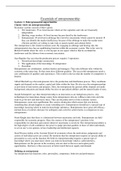Summary
Samenvatting Essentials of Entrepreneurship
- Course
- Institution
This is a comprehensive summary of the Essentials of Entrepreneurship course. I mention many examples and explain everything in detail. I've also included some of the literature in the summary and there are lots of images in it.
[Show more]



